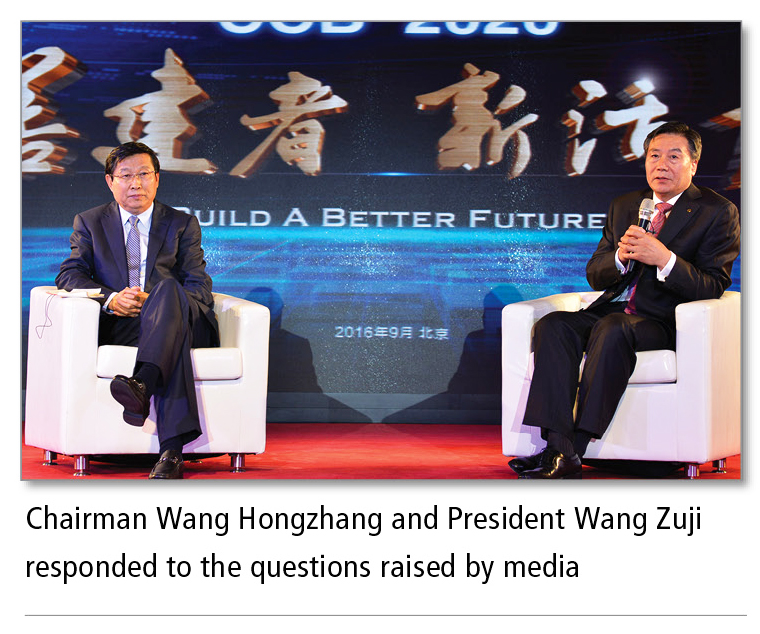After a decade of spectacular growth in China, on the banking transformation horizon, China Construction Bank (CCB) responded to the unprecedented challenges brought by the market ahead of time. The pace of growth was beginning to slow, and new market risks within the financial industry were emerging. CCB chose to take the lead among China’s banks and initiate a programme of “dynamic change” involving an overall transformation of the bank and how it does business.

The development of a world-class bank requires the accelerated development of customer service platforms, the diversification of income structure and scientific operations management. CCB was actively establishing itself as a banking group that creates the best possible value by ensuring it has sufficient capital, a sound organizational structure, standardized management, good governance and effective controls over all banking functions as a solid foundation for development. Most recently, at the CCB 2020 Promotion Presentation, Chairman Wang and CCB executives detailed the advances the Bank has made towards reaching its goal of complete strategic transformation by 2020.
CCB has built a solid foundation through accelerated growth of its subsidiaries and overseas businesses. CCB Group has seven subsidiaries in China: CCB Principal Asset Management, CCB Financial Leasing, CCB Trust, CCB Life, Sino-German Bausparkasse, CCB Futures and CCB Pension Management. The Group also includes one overseas non-banking subsidiary and 27 rural banks in China. These subsidiaries and rural banks form the basis of an integrated business platform. In addition, the Bank has employed integrated financing methods, such as bond underwriting, wealth management, trusts, leasing and IPOs to meet diversified customer demands.
In addition, CCB has committed to transforming into a responsive bank that offers healthy and comprehensive banking functions and convenient services. It is building a multi-functional business structure that offers diverse service portfolios, customized services, complete integrated functions and exceptional key strengths by 2020.
The bank strived to lower costs and improve efficiency through optimization processes, efficient operations, saved capital and application of scientific management.
Moreover, CCB has become a bank driven by new ideas, creativity, and research and development. Between 2013 and 2015, CCB implemented over 3,600 innovations, 3.5 times more than the previous three years. Innovative offerings, such as “Express Loans” and “Cloud Loans,” have become highly competitive products in the market.
Finally, CCB has unleashed a wave of smart products, services and models based on the “Internet of Things” and Big Data, all of which will contribute to building an online integrated financial services platform. To date, CCB has established 12 smart banks and a batch of flagship outlets that all follow the highest standards. It has taken the lead in banking by launching a Big Data strategy, the highlight of which is the “Xiao Wei” intelligent customer service platform.
Since the beginning of the transformation, financial assets under CCB’s management have increased by 161%. CCB President Wang Zuji said that since 2014, the Bank has implemented “the five changes”: becoming a bank that runs integrated businesses; offering multi-functional services; aiming for exponential growth; and becoming innovative and smart.
The Group’s income sources have become increasingly diversified, with non-interest income accounting for 37% of total income, a 10% increase compared with that before the transformation. The net profit of CCB’s integrated operating subsidiaries has also increased by 90%, almost doubling as a proportion of the Group’s total net profit. The services of the parent company and its subsidiaries have a particularly high level of synergy, and were worth RMB1.33 trillion during the first half of this year, an increase of 130% year-on-year.
CCB has always supported the development of the real economy. With infrastructure loans and capital raised for non-credit services reaching RMB2.8 trillion and RMB4.3 trillion, respectively, CCB has invested in more than 9,700 key national projects, totalling RMB 1.25 trillion. CCB has supported the reform of state-owned enterprises and the implementation of supply-side reform through intelligent financing. Loans to small and micro enterprises have amounted to RMB1.3 trillion, with borrowers reaching 280,000, demonstrating CCB’s devotion to helping small enterprises grow. The Bank took the lead in launching the “Yu Nong Tong”, a financial business, which benefits farmers through village banks.
CCB has notably improved its international competitiveness. The number of overseas commercial banking customers has surpassed 360,000, with total assets amounting to RMB1.34 trillion, an increase of 41% compared to the end of 2014.
Going forward, the banking industry will continue to face a number of challenges, including a slowdown in growth and economic restructuring. CCB remains confident and will accelerate its transformation. As Chairman Wang Hongzhang said, CCB is achieving good progress and is confident the Bank will achieve its goal of becoming a first-class international banking group that creates the best value by 2020.





.jpg)
.jpg)


